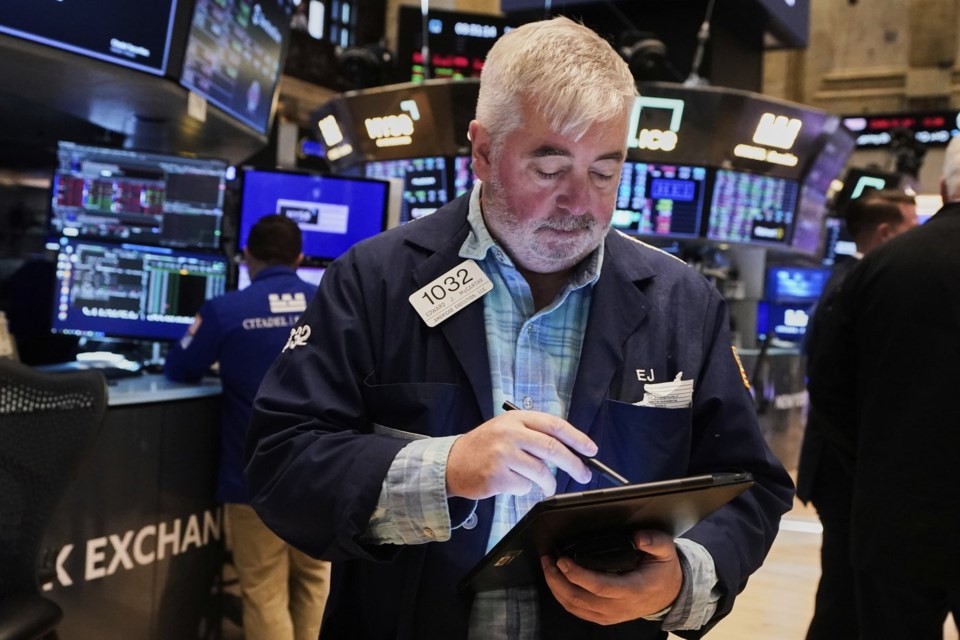NEW YORK (AP) — Wall Street is climbing as the roller-coaster ride created by President Donald Trump’s trade policies whips back upward, this time because of a temporary pause for tariffs on the European Union. The S&P 500 was 1.2% higher early Tuesday, its first trading since Trump said Sunday that the United States will delay a 50% tariff on goods coming from the European Union until July 9 from June 1. The Dow Jones Industrial Average was up 400 points, or 0.9%, and the Nasdaq composite was 1.5% higher. They’re on track to more than recover their losses from Friday, when Trump announced the tariffs.
THIS IS A BREAKING NEWS UPDATE. AP’s earlier story follows below.
European markets and U.S. futures jumped early Tuesday following a weekend trade truce between the E.U. and U.S. after Trump's threat late last week to tack on 50% imports from the trading bloc.
Futures for the S&P 500 climbed 1.5% before the bell, while futures for the Nasdaq rose 1.6%. Futures for the Dow Jones Industrial Average gained 1.4%. Those premarket gains were enough to wipe out all the losses from Friday when Trump went on his E.U. trade tirade.
Markets went into a tailspin early Friday after Trump posted on social media that trade talks with the European Union “were going nowhere” and that “straight 50%” tariffs could go into effect on June 1.
Trump on Sunday said he would delay a threatened 50% tarif f on goods from the E.U. until July 9 to give the trading partners time to negotiate.
The EU’s chief trade negotiator said Monday he had “good calls” with Trump administration officials and that the bloc was “fully committed” to reaching a trade deal by the July deadline.
In Europe at midday, London's FTSE 100 gained 0.8%, reopening after a British holiday on Monday.
Germany’s DAX added 0.7% while the CAC 40 in Paris picked up 0.2%.
Tesla's sales in Europe plunged for the fourth consecutive month, even as growth in the electric car market picked up pace, according to data released by an industry trade group there.
Sales of Tesla vehicles in 32 European countries tumbled 49% to 7,261 in April from 14,228 in the same month last year, according to the European Automobile Manufacturers’ Association. Sales of battery-electric vehicles by all manufacturers rose about 28%.
The numbers are the latest indication of how the Tesla brand is suffering because of the backlash against billionaire CEO Elon Musk over his far-right views.
Despite the grim sales figures, Tesla shares rose 2.1% before the bell Tuesday, perhaps propelled by optimism over an E.U.-U.S. trade deal.
Southwest Airlines rose close to 3% in premarket trading as the carrier prepares to implement its new policy on Wednesday that will charge most travelers for checked bags. Southwest had built years of advertising campaigns around its policy of letting passengers check up to two bags for free, but the struggling airline has come under pressure from activist investors to boost profits and revenue.
Data on U.S. consumer confidence and housing prices are due later Tuesday.
In Asian trading, Japan's Nikkei 225 reversed early losses to gain 0.5%, closing at 37,724.11 after the central bank's said he anticipates raising interest rates in coming months due to inflationary pressures.
Bank of Japan Gov. Kazuo Ueda cited rising food prices, with rice prices doubling in the past year, as one factor. Inflation in Japan is now higher than in the U.S. or Europe and above the BOJ's target level of about 2%.
But the central bank also has to take into account trade policies, he said without directly mentioning Trump's tariff hikes. Risks from uncertainty for the global economy complicate the BOJ's goal of raising its very low benchmark interest rate of 0.5%, Ueda said in a speech Tuesday.
“We are now closer to the target than at any time during the last three decades, though we are not quite there. Our recent path has been affected in a unique way by supply shocks,” Ueda said.
Hong Kong's Hang Seng gained 0.4% to 23,381.99, while the Shanghai Composite index shed 0.2% to 3,340.69.
In South Korea, the Kospi lost 0.3% to 2,637.22.
Australia's S&P/ASX 200 climbed 0.6% to 8,407.60 and Taiwan's Taiex lost 0.9%. In India, the Sensex fell 1.2%.
U.S. benchmark crude oil ticked down 7 cents to $61.46 per barrel. Brent crude, the international standard, lost 4 cents to $64.08 per barrel.
The U.S. dollar rose to 144.08 Japanese yen from 142.85 yen. The euro fell to $1.1348 from $1.1388.
Elaine Kurtenbach And Matt Ott, The Associated Press




